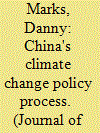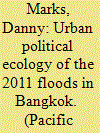|
|
|
Sort Order |
|
|
|
Items / Page
|
|
|
|
|
|
|
| Srl | Item |
| 1 |
ID:
100353


|
|
|
|
|
| Publication |
2010.
|
| Summary/Abstract |
China has recently become the world's largest emitter of carbon and is already facing many harmful effects domestically from climate change. Chinese leaders have therefore made a high-level commitment to curb emissions, as evident in the 2007 National Climate Change Program. However, the government has missed many of its targets, in particular its goal of reducing energy intensity. This essay argues that China is missing its targets because of a number of factors which stem from the fragmented nature of China's authoritarian system. First, environmental policies are too broad and complicated, making it difficult for regulators to enforce the laws. Second, the current incentive structures of promotion and salary cause local officials to give higher priority to economic development than to environmental issues. Third, environmental regulators, such as the judiciary and environmental agencies, remain weak and impeded by enforcement obstacles. While positive changes have occurred, such as the emergence of NGOs and the media as environmental watchdogs and a burgeoning clean technology sector, much remains to be done to improve the long-term viability of climate change policies in China. Based on the preceding analysis, this essay recommends ways by which the government could improve the process of enacting and implementing climate change policies. It also urges the international community to sympathize with the Chinese government and, by leading the way, help the government gain greater compliance with climate change policies.
|
|
|
|
|
|
|
|
|
|
|
|
|
|
|
|
| 2 |
ID:
169139


|
|
|
|
|
| Summary/Abstract |
In what ways are lifestyles in urbanising Thailand, increasingly oriented towards shopping malls related to the threat to the wildlife and struggles for subsistence in distant Lao hinterlands? Our article answers this question by looking at the workings of electricity as the key infrastructure that connects these seemingly unrelated events and practices. We argue that the circulation of electricity flows along uneven channels, shifting injury and environmental harm across international borders. This circuit is perpetuating inequality and environmental injustice in the Lower Mekong. To demonstrate this claim, we analyse the electricity sector at numerous scales and locations – the urban scale in Bangkok, the country scale of Thailand and then Laos and the local community scale in Laos. We then discuss by what means various material and social processes and actors at these different scales form this circuit. Looking at circuits of power allows us to link the story of electricity consumption with that of production, with an emphasis on their extraterritoriality, multiplicity and boundaries. Our findings illustrate the effects of this circuit on spaces far from a thought‐of urban area. Furthermore, we demonstrate the ways in which these effects have produced inequality and injustice across borders.
|
|
|
|
|
|
|
|
|
|
|
|
|
|
|
|
| 3 |
ID:
108427


|
|
|
| 4 |
ID:
171907


|
|
|
|
|
| Summary/Abstract |
The 2011 Bangkok floods, a slow onset event, flooded significant parts of the city. The state's response to flooding followed a traditional cultural and hierarchical approach to justice within Thailand, stemming from Buddhist values, an informal caste system and monarchical order. This resulted in a spatially uneven outcome, with the ‘preservation’ of the central city and two‐month‐long floods in outer suburbs, exacerbated by inadequate management and coordination. Suburban communities sought a more egalitarian notion of disaster justice, with hazard burdens shared more equitably and people having adequate access to decision‐making over the distribution of disaster risk and compensation for damage. Extensive damage, and reduced livelihoods, caused friction between the two views, and protests, contestations and conflicts during the floods, in four different community contexts in northern Bangkok. By generating alternative discourses, challenging the hierarchical notion of justice and taking direct action to removing floodwalls, protesters sought to reshape the spatiality of the floodwater and claim inclusive citizenship and their right to the city. Existing perceptions of disaster justice, usually focused on liberal state responses to understanding disasters as natural episodes, are alone inadequate to explain the outcomes of and responses to disasters in different cultural contexts.
|
|
|
|
|
|
|
|
|
|
|
|
|
|
|
|
| 5 |
ID:
174823


|
|
|
|
|
| Summary/Abstract |
Currently approximately 9 million tons of plastic enter the world's oceans annually. This is a major transboundary problem on a global scale that threatens marine wildlife, coastal ecologies, human health and livelihoods. Our concern in this paper is with the environmental governance of marine plastic pollution that emanates from Thailand, the sixth biggest contributor globally. By zooming in on land‐based polluters in Thailand, we highlight both the systemic nature of the marine plastic problem and the relative impunity with which drivers of transboundary environmental harm function at all levels of governance. Drawing from 19 interviews conducted with actors from the public, private and non‐profit sectors, we examine three stages of the problem: production, consumption and waste management. We found that three major barriers prevent Thailand's government, private sector and citizens from engaging in the sort collective action needed to reduce marine plastic pollution. They are: (i) insufficient incentives to enact political change; (ii) scalar disconnects in waste management; and (iii) inadequate public and private sector ownership over plastic waste reduction. As the state alone cannot change corporate and consumer behaviour, we argue that multi‐stakeholder efforts across organisational scales of governance and administrative boundaries are needed to address the barriers.
|
|
|
|
|
|
|
|
|
|
|
|
|
|
|
|
| 6 |
ID:
140394


|
|
|
|
|
| Summary/Abstract |
This paper uses an urban political ecology analysis to question the discourses used by Thai government leaders about the causes of the 2011 floods in Bangkok and the solutions that they have proposed in response. In contrast to their argument that the main causes of the floods in Bangkok were climate change and nature, it argues that the causes of the 2011 are compound. They are a result of human-nature interactions: while Thailand did receive heavy rainfall that year, a number of human activities interacted with this heavy rainfall to create the floods. During the past few decades, local political elite have risen to power and profited the most from Bangkok’s urbanization activities while changes to the physical environment of Bangkok made those living there more vulnerable to floods. These activities include massive land use change and concretization which drastically increased run-off, over-pumping of groundwater and the filling of canals. During the past few decades, the local political elite profited the most from Bangkok’s industrialization and urbanization activities while changes to the physical environment of Bangkok made those living there more vulnerable to floods. Further, both the local and national’s government overreliance on antiquated and poorly-maintained infrastructure made the city more vulnerable to the 2011 floods. In 2011, human decisions, particularly by politicians, about where to direct and block water heavily influenced which groups were most vulnerable. As a result, the inner city were protected at the expense of those living in the city’s peripheral areas. Further, the low institutional capacity of the state, at both the local and national level, diminished the state’s capacity to reduce the risks of floods. Analyses of disasters in urban areas need therefore need to consider how discourses, socio-political relations, and ecological conditions shape governance practices of disasters.
|
|
|
|
|
|
|
|
|
|
|
|
|
|
|
|
|
|
|
|
|